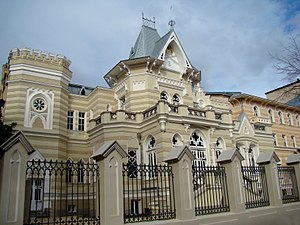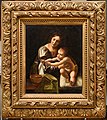Art Palace of Georgia - Museum of Cultural History
| საქართველოს ხელოვნების სასახლე – კულტურის ისტორიის მუზეუმი | |
 | |
| Location | Georgia |
|---|---|
| Coordinates | 41°43′N 44°47′E / 41.72°N 44.79°E |
| Website | www |
Art Palace of Georgia - Museum of Cultural History also referred to as Art Palace, (Georgian: საქართველოს ხელოვნების სასახლე – კულტურის ისტორიის მუზეუმი) is located in Tbilisi, Georgia. It is located on Kargareteli Street #6, and was the former Graph Oldenburg's Palace. The museum's exhibition halls are open from Tuesday till Sunday (10:30 - 17:30)
Until April 8, 2020, it was called the Georgian State Museum of Theater, Music, Cinema and Choreography. The name was changed according to the resolution of the Government of Georgia.[1]
History
[edit]Georgian Art Palace - Museum of Cultural History is a depository of Georgian cultural objects. The museum is housed in a building in Tbilisi. It was designed by a well-known architect of the time, Paul Stern, and, as an example of historicism, bears traces of Gothic architecture and Islamic architecture.[2] Its interior was partially designed by Polish architect Aleksander Rogojski.[3]

In 1882, Duke Constantine Petrovich of Oldenburg (1850-1906), a member of the Russian branch of the House of Oldenburg, met Agrippina Japaridze in Kutaisi. At the time she was married to Georgian nobleman from the House of Dadiani. Constantine Petrovich confessed his love for her. The confession turned Agrippina's head; they eloped and left Kutaisi and went to settle in Tiflis. Prince Oldenburg commissioned the building of the palace for his beloved as a token of his great affection for her.
In 1927, the Museum of Theatre, founded by David Arsenishvili (1905-1963)- a famous Georgian public figure (later appointed as the First Director of the Andrei Rublev Museum in Moscow), was moved to the building.[4] The museum has more than 300,000 objects that provide information on the development of Georgian theatre, cinema, circus, folklore, opera, and ballet, as well as providing insight into the lives of figures in respective fields.
Some museum exhibits date back to the classical era. Of particular note is an antique mask which was excavated by archeologists in the town of Vani.[5]
Collection of Georgian Fine Arts
[edit]Georgian Art makes up large part of the collection. Around 10,000 exhibits of over 300 Georgian artists inform us about evolution of Georgian scenic design. The depository of fine arts contains portraits of theater actor and directors, sketches of stage decorations and costumes.
-
David Kakabadze Decoration for Ilo Mosashvili play 'Station Master' 1947
-
Decoration sketch for the play 'King Lear' (1948) by Sergo Kobuladze
-
Petre Otskheli Costume of the aviator for the leo Esakia movie 'Winged Painter' 1936
-
Decoration sketch for the play 'Solar Eclipse in Georgia (1932) by Elene Akhvlediani
-
Pilgrims from Samarkand' by Gigo Gabashvili (1891 - 1894) by Gigo Gabashvili
-
The Khan Thrown in the River' Kura by Lado Gudiashvili (1938) by Lado Gudiashvili
Collection of Russian Fine Arts
[edit]Besides Georgian artists, the collection also contains works of Russian painters as well as works of representatives of Russian Silver age World of Art Konstantin Korovin, Lev Bakst, Alexander Benua, Alexander Golovin and Viktor Simov. The union was founded in the beginning of 20th century in St. Peters-burg.
-
Aleksander Benua Costume for the Molière Play 'The Burgeois Gentleman' 1922
-
Capturing of Aul Franz Rubua 1856-1928
-
Depiction of Nikipore Kulesh. (1902 - 1920) by Nikipore Kulesh
-
Lev Bakst Ida Rubenstein (1883-1960) as Cleopatra
-
Viktor Rindin (1902-1974) Costume for the Zakaria Paliashvili opera 'Abesalom and Eter'
Collection of Western European Fine Arts
[edit]Interest in European art has existed in Georgia since ancient times. Precisely, Western European art became popular in Georgia in 18th century. Representatives of Georgian nobility traveled to Europe frequently and tried to bring the culture, art and traditions back in homeland.
-
A Girl with a Dog (1800-1850) By unknown
-
Houses Near Bay (1882) by Gustav Schonleber
-
Jealous Wife (1610-1690) by unknown
-
Landscape by Josef Thoma (1865)
-
Unknown Painter. Leonardo da Vinci school (XVII C.) Virgin Mary with Child. Based on work of Giovanni Boltraffio
-
Still Life by Michelangelo Meucci (1890)
Collection of Persian Fine Arts
[edit]The Art Palace also owns collection of Persian Fine Arts. Collection consists of 4 Qajar miniature Paintings dated back to XIX Century and also painting of King Solomon. As in Jewish and Christian traditions, Islam promotes the ancient King Solomon as a model ruler; wise and just.
-
Qajar Miniature (1800 - 1850). Zarb
-
Qajar Miniature (1800 - 1850). Tar
-
Qajar Miniature (1800 - 1850). Santur
-
Qajar Miniature (1800 - 1850). Kamancheh
-
King Solomon and his Court (late 19 century) by Unknown
References
[edit]- ^ Resolution of the Government of Georgia # 224, April 8, 2020, st. Tbilisi. On Legal Entity of Public Law - Georgian State Museum of Theater, Music, Cinema and Choreography - Art Palace, on changing the name and giving it the name of the Legal Entity of Public Law - Georgian Art Palace - Museum of Cultural History
- ^ "ABOUT SIGHTS – GEORGIAN STATE MUSEUM OF THEATRE, MUSIC, CINEMA AND CHOREOGRAPHY". Georgia About. Retrieved 14 April 2018.
- ^ Opaska, Janusz (2012). "Działalność polskich architektów w Tbilisi w XIX i początkach XX wieku". Kwartalnik Architektury i Urbanistyki (in Polish). No. 57/1. p. 15.
- ^ Feodorova, Maria. "Georgian cultural legacy in a museum of theatre, music and cinema". Museeum. Archived from the original on December 15, 2018. Retrieved 14 April 2018.
{{cite web}}: CS1 maint: unfit URL (link) - ^ "Archeology of Vani". museum.ge. Retrieved 2019-07-12.






















